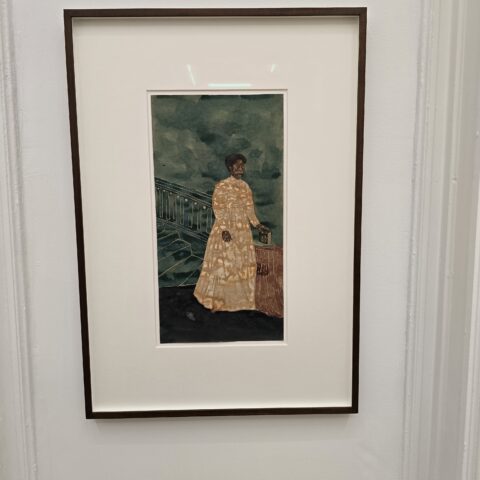By Cheikh Athj | with thanks to NewBlackMan (in Exile)
Wednesday, August 13, 2014.
Dear ?uestlove,
I recently read your interview at TIME Magazine and found myself softly massaging my jaw. Let’s just say that it hit the floor quite hard. Frankly, I was surprised by your comments on Iggy Azalea and how you explained your views on her involvement in hip hop. There is no crime in admitting that Iggy’s music is catchy, or a summer banger. Children and adults alike are bobbing their heads to “Fancy” as hard as a car hitting a pothole, and there’s something to be said about any music that can command the body into movement. However your thoughts, which reeked of post-racial rhetoric and beseeched the black community to simply “come to grips that Hip-hop is a contagious culture,” seemed to dance around the actual issues involving Iggy Azalea. Namely, the following: her appropriation of black southern dialect; the exploitative history of black cultural production; Iggy’s prominence in Hip-hop when black women have been denied artistic exposure; and her racism even while practicing an art form rooted in black American culture.
The landscape is changing, I do not disagree. But to adopt a color-blind method of acknowledging white rappers’ presence in hip hop is dismissive and unreliable. Iggy Azalea is popular because of white corporate ownership of the hip hop brand. She is popular because she is being marketed as the “blond white Australian woman who is running hip hop.” She is popular because women of color are habitually denied a stage to talk about the invisibilization of their life experiences. She is popular not because of her lyrical ability, but because she is an embodiment of Western beauty ideals and a perfect vehicle for proving the prevalence, the naivety, and the power of white supremacy. And when no black artist reached number one on the billboards within the past year – and white artists who’ve appropriated forms of black music have – we must consider why Iggy Azalea is topping the charts and similar, more authentic artists aren’t.
?uestlove, I love you man; all that you’ve done for hip hop and music in general is indeed praise worthy. And it is because I love you and your work that I have to tell you how misguided your opinions are, or, at the very least, how lazily thought out they are. The issue is that they don’t reckon with the economic and structural reasons why someone like Iggy Azalea — despite the work that she’s put in and the music that she’s put out — is allowed artistic freedom in an art form that is not a part of her cultural history. More so, your views invisibilize the struggles many talented black people (specifically women of color like Rapsody, L.atasha A.lcindor, and Noname Gypsy who have worked for years to have their art recognized and are only barely gaining popular exposure) face in terms of corporate sponsorship and access.
Here is the issue: for every Iggy Azalea that is not checked for her privilege as a white artist capitalizing off of black artistic and cultural production in an industry dominated by corporate white supremacy, another handful of capable and talented black artists are denied the right to have their art seen. It’s not simply about black people accepting that “Hip-hop is contagious,” but about people increasing their awareness of who they are, how they interact with Hip-hop, and how privilege informs their place in an art form that is rooted in black American culture.
Iggy Azalea has proven time and time again that she is not interested in the reasons why hip hop exists in the first place. Rather, for her, it is a means of accumulating capital and, whether or not she knows this, committing the age old crime of white appropriation of black cultural production — all without paying homage to the racially charged historical reasons behind hip hop’s existence. I am saddened that you seem to be ignoring this.
Now, I too am an advocate for changes in hip hop that increase inclusivity. Since its inception, we’ve watched the art form grow to become arguably more inclusive of people that have been historically marginalized in its arena. Queer people of color – rappers like Le1f, Mykki Blanco, Cakes Da Killa, and Big Freedia, to name a few – are more openly, fearlessly affirming their presence, while women of color are carving out spaces for themselves to be seen, heard, and respected. Nonetheless, we have not come far enough. Misogyny, specifically misogynoir is still rampant in hip hop, as are queerphobia, homophobia, transphobia, and transantagonism.
We are at a pivotal point, a plateau of sorts: artists are shifting the genre in terms of the sound, but lyrical content is still rooted in the same oppressive ideas that drove the creation of hip hop. Still, there are people talking — people who want more from the genre as a whole: a sense of true progress, a shift toward more progressive creation. Writer and scholar M.K. Asante wrote an entire book on how the youth of this generation and the next can address the traumas wrought by white supremacy, historic and present realities of inequality, and hip hop’s narrow-minded beginnings.
I don’t want this to be misconstrued as me complaining about “culture vulturism,” as you put it. We can argue all day about whether white people making rap music is preying on black culture, or if white input in a product of the black American experience is necessary. Hell, as it stands white boys from the suburbs consume about 80% of Hip-hop. Wouldn’t it then make sense if white people had a say since they help commercial rap produce so much capital? But I think the issues at hand run deeper than both of these notions. People need to complicate how we think of white appropriation of ethnic cultural artifacts, and how often the messages of cultural forms are lost when blindly appropriated.
We need to think about how white supremacy and the exploitative history of black labor have paved the way for Hip-hop to be “run by a white blonde Australian woman,” or why, as you mention, “when you think of soul music… that’s a thing of the past.” We also need to think about how our voices will reverberate when we have gained a level of visible prominence.
It is incredibly troubling when prominent black artists who have had to work hard for their success begin to echo the mythic post racial dream that America refuses to wake up from. That’s you, ?uestlove. In a moment where America is trying to prove its colorblindness while minorities still suffer at the hands of racial discrimination, making oft-handed statements about cultural vulturism and simple acceptance of appropriation is lazily dangerous. As someone who has the emotional and intellectual sensibilities to acknowledge your own status as a target of racial discrimination, you have to recognize the danger the black community faces when our cultural artifacts are stolen from us. You have to recognize the danger women of color face when they are not allowed to capitalize off of their own cultural production. You have to do better my brother.
We as a community, and as a nation, have got to do better. And it starts with refuting the post racial myths that mass media continues to preach, and delving into a more critical discussion about how OUR cultural history, and more importantly our labor, continues to be exploited for its marketability.
Signed,
Cheikh Athj, a loyal and disheartened fan
***
Cheikh Athj is a college junior who still hasn’t figured out how this whole “academia” thing works. When he isn’t watching World Star vine compilations, you can find him philosophizing crime, dreaming about utopia, or singing jazz chords.
Why Iggy Azalea Is Not Changing the Game: A Letter to ?uestlove





